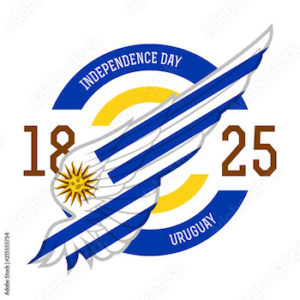
*On this date, in 1825, Uruguay gained independence from Spain.
Uruguay, officially the Oriental Republic of Uruguay, is a country in South America. Like many South American countries, the middle passage, race, and class issues motivated Uruguay’s quest for self-rule and independence. In 1811, José Gervasio Artigas, who became Uruguay's national hero, launched a successful revolt against the Spanish authorities, defeating them on May 18 at the Battle of Las Piedras. In 1813, the new government in Buenos Aires convened a constituent assembly where Artigas emerged as a champion of federalism, demanding political and economic autonomy for each area and the Banda Oriental in particular.
It shares borders with Argentina to its west and southwest and Brazil to its north and northeast, bordering the Río de la Plata to the south and the Atlantic Ocean to the southeast. Uruguay covers an area of approximately 176,000 square kilometers (68,000 sq mi). It has an estimated population of 3.51 million, of whom 2 million live in the metropolitan area of its capital and largest city, Montevideo.
The assembly refused to seat the delegates from the Banda Oriental; however, Buenos Aires pursued a system based on unitary centralism. As a result, Artigas broke with Buenos Aires and besieged Montevideo, taking the city in early 1815. Once the troops from Buenos Aires had withdrawn, the Banda Oriental appointed its first autonomous government. Artigas organized the Federal League under his protection, consisting of six provinces, four of which later became part of Argentina. In 1816, 10,000 Portuguese troops invaded the Banda Oriental from Brazil; they took Montevideo in January 1817.
After nearly four more years of struggle, the Portuguese Kingdom of Brazil annexed the Banda Oriental as a province under "Cisplatina." The Brazilian Empire became independent of Portugal in 1822. In response to the annexation, the Thirty-Three Orientals, led by Juan Antonio Lavalleja, declared independence on August 25, 1825, supported by the United Provinces of the Río de la Plata (present-day Argentina). This led to the 500-day-long Cisplatine War. Neither side gained the upper hand. In 1828, the Treaty of Montevideo, fostered by the United Kingdom through the diplomatic efforts of Viscount John Ponsonby, gave birth to Uruguay as an independent state.
August 25 is celebrated as Independence Day, a national holiday. The nation's first constitution was adopted on July 18, 1830.